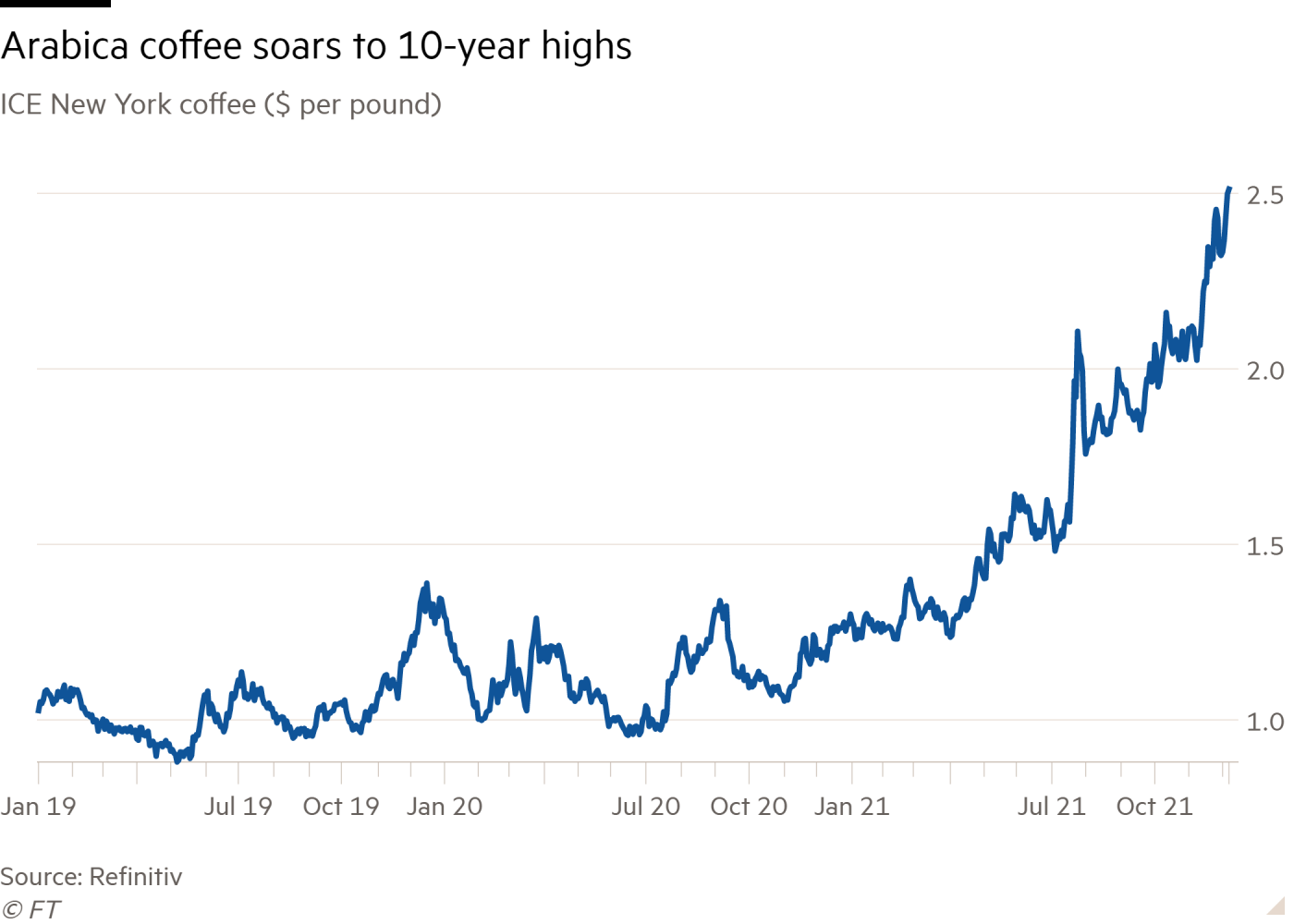Hike in coffee prices for 2022
2 min read
Coffee prices hit 10-year high as shipping issues squeeze supply
By: Financial Times on Dec 13, 2021 10:12:55 PM

Concerns about challenging weather have also driven up prices Futures prices for arabica beans are at $2.50 a pound, almost double their level at the start of 2021.
Coffee prices on futures markets have rallied to a 10-year high, with companies and traders dashing to lock in supplies as they contend with shipping bottlenecks and a late-year rise in demand.
Traders are turning to futures, products that allow them to secure deliveries at a set price, on concerns they may be unable to obtain adequate stockpiles on the “physical market” where they can be more selective about the product they will receive.
In turn, inventories are being drained from Intercontinental Exchange, one of the main coffee futures trading venues, which has caused futures prices to rise even further, traders said.

This decline in inventories sent “a very loud signal to the market that there is a continuing immediate shortage of coffee”, said Ilya Byzov at Sucafina.
Futures prices for the higher quality arabica beans are now commanding $2.50 a pound, almost double their level at the start of 2021.
At the same time, the Coffee Exporters Council of Brazil, the world’s largest coffee producer and exporter, said traders had struggled to get bookings for containers and vessels, and had faced frequent loading postponements from shipping companies. It said coffee export volumes in October had fallen 24 per cent compared with last year.
Container freight rates, which have soared this year, remain elevated and the worries about bottlenecks had fuelled “just in case” buying, said Carlos Mera, analyst at Rabobank. “With more coffee stuck in transit, you need extra coffee on hand to meet demand,” he said.

The sharp rise in bean prices has also led to hoarding by farmers, limiting the flow of exports and adding to the upward pressure on prices. Cases of “defaults”, where coffee farmers failed to deliver pre-agreed contracts on the physical market, was increasing, according to US Department of Agriculture officials stationed in São Paulo.
“The three largest arabica producers, Brazil, Colombia, and Ethiopia, are experiencing increased rates of default, where farmers fail to deliver coffee at agreed-upon prices so they can attempt to re-sell at current higher prices,” the USDA said in its latest report on Brazilian coffee.
Worries about another drought in Brazil also added to the coffee price rally. Coffee farmers there were hit by freezing temperatures because of severe frosts in July. While the frosts did not impact this year’s harvest, the damage to the trees, which followed the worst drought in a century, raised concerns about the health of the plants as well as the quality of the beans in the coming season.
The arrival of the La Niña weather phenomenon, which tends to bring dryness in the southern part of South America, for the second consecutive year, has raised fears of low production volumes at a time when demand remains firm. The southern part of Brazil has had lower than normal levels of rainfall, leading to worries among farmers, traders said.
Meanwhile, concerns about the new Omicron coronavirus variant potentially leading to lockdowns in Vietnam also pushed up futures prices for robusta, a lower-quality bean traded in London.
Jack Scoville at commodity brokers Price Futures Group in Chicago warned: “Covid has also returned to Vietnam and now the rest of the world, and could be a factor in interrupting shipments.”
Aluminium prices hit decade high
Production cutbacks in China in bid to reduce pollution push up global costs for the metal.
Has grocery price inflation hit the peak?
In the weeks leading up to 16th April 2023, grocery price inflation rose by 17.3%, which was a...

